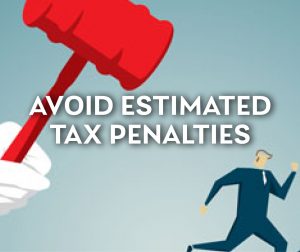Individuals who are self-employed will be all too familiar with estimated tax penalties which may crop up in the instance that you have under-payed your tax obligation. The good news is that, in most cases, these estimated tax penalties can be easily avoided, even if you have severely underestimated the amount of money that you owe the IRS. Here is what you need to know.

How to avoid estimated tax and under-payment penalties
There are a handful of different ways to avoid having to pay any estimated tax and under-payment penalties. They are as follows:
• You can avoid estimated tax penalties if you can prove that you were unable to make the required payment due to an extenuating circumstance over which you had no control. This circumstance could have been a “casualty event, disaster, or other unusual circumstance and it would be inequitable to impose the penalty”, according to the IRS.
• You can avoid estimated tax penalties if you owe less than $1,000.
• You can avoid estimated tax penalties as long as you pay a minimum of 90% of your tax obligation.
• You can avoid estimated tax penalties if you pay at least 100% of the tax owed in the prior year.
• You can avoid estimated tax penalties if you became disabled during the course of the current tax year or during the tax year before for which you should have made estimated payments.
Ultimately, the easiest way in which to avoid incurring estimated tax or under-payment penalties is to ensure that you make accurate estimated payments. While it is impossible to predict exactly what you will owe, it is possible to get a closer estimate. A good rule of thumb is to examine what you owed in tax payments in the previous tax year and make four equal payments which total at least 10% more than that amount.
Need help with your estimated payments or with filing your taxes? The CPA specialists at Georgen Scarborough Associates, PC are here to assist. Contact us today for further information regarding our services.
